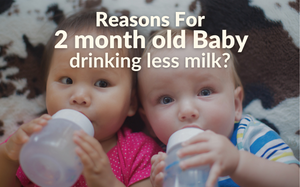As you step into parenthood, it may seem like you are on an endless roller-coaster of diaper changes day and night as your baby’s poop habits change several times during the first few weeks.
The frequency, consistency, and colour of the poop are indicators of your baby’s health. Here are answers to some common questions about your newborn baby's poop and pee patterns that may help you understand whether your baby is healthy.
What is the normal pee and poop pattern for babies?
A newborn's pee and poop patterns can be understood based on the frequency and colour of pee and poop and the consistency of poop.
1. Frequency of Pee and Poop:
During the first few months, your baby may pee every one to three hours a day. At least four wet diapers a day usually means there’s no cause for worry. In hot weather or if the baby is ill, the pee may drop to half its usual output.
Over time, you may notice several changes in the frequency of your baby’s stools. Breastfed babies may poop six to twelve times a day during the first few weeks and later up to six times a day. Formula-fed babies may initially poop up to eight times a day, and by six to 12 months, only up to three times a day.
2. Colour of Pee and Poop:
A healthy baby will have pale to dark yellow urine. If your child does not drink a lot of liquid, the urine will be concentrated and appear darker than usual.
While you observe your baby’s poop patterns, you will notice that during the first couple of days after birth, your newborn's pooping thick, black or dark green stool. This is due to a substance in the baby’s intestines before birth called meconium. Once this matter passes, the poop colour changes to a yellowish-green.
When your baby starts eating foods other than milk, the foods will also have a dramatic effect on the colour of your baby’s poop, which ranges from brown and tan to yellow or green. At times, you may even see undigested pieces of food. Also, if your baby is given iron supplements, the poop will appear dark brown.
3. Consistency of Poop:
A breastfed baby will have grainy, mustard-yellow stools that may be soft or loose to runny inconsistency, while a formula-fed baby will usually have firmer, yellow, or tan stools. When you introduce solid food after six months, the poop will have a firmer consistency and a stronger odour than before.
Related - How To Introduce Solid Food To Baby
What Variation in the Pee or Poop Should Concern Me?
The colour and consistency of poop and pee will change as your baby grows or due to other causes such as illness or changes to the mother’s or baby’s diet.If your baby has soft stools, is nursing regularly, and is gaining weight, there’s usually no cause for worry. The changes in the baby’s poop that you should watch out for are:
Frequency:- Fewer stools than usual or straining to pass stools.
- Stools that are more frequent than usual and very watery.
- Changes in the colour of the pee may also occur in the case of an illness or if your baby drinks fewer liquids.
- Hard and dry stools.
- Forceful or explosive watery stools.
Report these concerns to your doctor, so he/she can tell you what needs to be done.
Related - Newborn Milestones with Feeding & Sleeping Schedule
When Should You Call A Doctor?
Your baby will need to visit the doctor immediately if you observe any of the following changes in the baby’s pee or poop, as they could indicate a serious illness:
Frequency of Pee and Poop:
- Peeing along with abdominal pain, fever above 100.4°F, fussiness, repeated vomiting, or poor feeding.
- A sudden increase in the number of poops may be watery.
- Bad-smelling and cloudy, bloody pee, or bloodstains on the diaper.
- Maroon or bloody, black, grey, or white poop.
Consistency of Poop:
- Poop with a large amount of water, mucus, or blood.
Your baby’s pee and poop habits, colour, and consistency say a lot about their health. If you notice diarrhoea, watch for dehydration. If your baby has a fever, check their urine output. Discuss with your paediatrician what is normal and what indicates a serious underlying cause. Keep your baby clean and change wet diapers regularly to avoid rashes and infections.













LEAVE A COMMENT